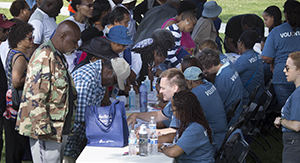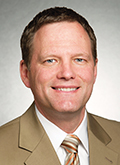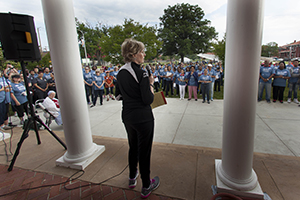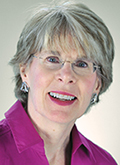System hopes to sway public discourse on poverty from blame to compassion
By JULIE MINDA
Ascension's Providence Health System in Washington, D.C., hosted its first-ever Medical Mission at Home, a daylong blitz in which volunteer clinicians, social service providers and others offered free medical care and a wide range of social services to community members in need. Indications prior to the event were that more than 200 volunteers from Providence and partner organizations would be providing care and services to about 500 people in the community who cannot otherwise afford the care they need.
The event is a pilot for Ascension, which plans to have the vast majority of its 131 hospitals organize annual medical missions in their service areas by 2017.

Volunteers assist patients at the Medical Mission at Home. (Photo credit: Paul Fetters)
"Ascension has a long-term vision of hosting Medical Missions at Home nationwide on a single day of the year, to come together around one common mission and one day of hope and healing," said Timm Glover, senior vice president of mission integration for Ascension Health.
Gladys Marie Desselle is a nurse and senior director of maternal and infant services at Providence. Prior to the event, she told Catholic Health World she looked forward to providing Medical Mission at Home attendees with basic nursing assessments and information on healthy pregnancy, breast-feeding and infant care. "I just had to be a part of such an important effort," she said.
"It is important for me to know that I am making a difference. This is so much in alignment with (Providence's) values and why we exist," she said.
Southern roots
The Medical Mission at Home originated at Ascension's Nashville, Tenn.-based Saint Thomas Health system in 2007 as a formation project of Nancy Anness, who is now Saint Thomas vice president of advocacy, access and community health, and Amber Sims, who is now vice president of Saint Thomas Health Alliance, a clinically integrated network of physician practices, clinics and hospitals. (Sims is one of nine recipients of CHA's 2015 Tomorrow's Leaders recognition.)
As part of a two-year executive formation course, Anness and Sims came up with and implemented the idea of organizing volunteers to serve in a medical mission in the volunteer's own communities. Over the past eight years, the five hospitals within Saint Thomas have hosted more than 20 daylong medical missions in their communities.
The Saint Thomas medical missions have evolved into major undertakings, bringing hundreds of volunteers together for a day of service to reach several hundred poor and vulnerable community members.

Glover
Glover is a former senior mission leader at Saint Thomas Health. He said Ascension has been looking for opportunities to standardize across the system programs that effectively address the system's mission and that are replicable. Medical Mission at Home fits the bill; and so Ascension's Mission Integration Leadership community, which includes all the mission integration leaders from across the system, recommended the program's expansion beyond Nashville. An Ascension task force created a tool kit on how to coordinate and launch a domestic medical mission that is based on the model developed from Nashville. Providence is testing the tool kit and approach.
Gaps to address
The Providence event took place June 6 from 9:30 a.m. to 3 p.m. at a meeting and demonstration space in Ward 8, one of Washington, D.C.'s most economically depressed wards. Providence and a network of partners that includes federally qualified health centers, social service agencies and other government agencies provided basic medical and behavioral health care and screenings, dental care, foot care, wellness information, social services, and spiritual care services.

Amy Freeman, president and chief executive of Washington, D.C.'s Providence Health System addresses volunteers at the June 6 Medical Mission at Home, hosted by Providence. (Photo credit: Paul Fetters)
Amy Freeman, Providence president and chief executive, said community members in Ward 8 have great unmet needs. She said there are pernicious income-based health disparities in the nation's capital.
She said, "We talk about access to insurance, and that was addressed through the Affordable Care Act. And we talk about access to care, and D.C. has a great system, including many federally qualified health centers. So, if we have insurance and access to care, what are the next barriers to think about?
"Social determinants of health are major contributors to the gap in accessibility," Freeman said. She noted that transportation concerns, behavioral health challenges and "the complexities of life" prevent people from accessing care.

Freeman
Glover added that by offering free care, domestic medical missions begin to address a health access problem associated with "the growing issue of underinsurance … People postpone accessing needed care because they can't afford their deductible or copay."
Follow-on care
Glover said since deep-rooted issues underlie access problems, Ascension medical missions are not "one-hit" events. Through extensive planning and coordination, Providence and its partners ensured they had a referral plan for people with needs not covered by the volunteers at the event, and for people with specialty care needs that surface through the screenings.
Also, volunteers at the event served as navigators to help attendees sign up for health insurance, connect to a medical home, schedule follow-up medical appointments, find transportation — whatever they needed to effectively connect with the health system going forward.
"We want to provide impactful service," said Glover. He likened the Medical Mission at Home model of care to an iceberg. While the blitz events address the visible, immediate needs, coordinators also have set up an infrastructure to address deeper needs lurking below the surface. They also have set up systems for recording metrics from the day and measuring the impact of the Medical Mission at Home.
Layers of outreach
Ascension's iteration of the domestic medical mission also includes advocacy and communications activity, noted Glover and Freeman.
In Nashville, medical mission planners have invited elected and appointed government officials to the daylong service events — and have even included them in providing services, said Glover. Some Tennessee legislators have helped to wash the feet of Medical Mission at Home patients and to guide them between service providers. The government officials "had dialogue with them, and that gave them firsthand experience of what people have to overcome to access care," said Glover. Freeman said government officials took part in the Washington, D.C., day.
Glover said Nashville planners also used media outreach to convey messages about care access, in conjunction with Medical Mission at Home. "We're trying to change public discourse, from blame to compassion. Instead of having people blame the poor for their choices, or blaming politicians, or blaming institutions, they need to understand what the needs are, to look at the structures at play and to realize it's a problem to solve."
Freeman and Glover added that the planning and execution of the events enable hospitals to strengthen their relationships with existing community partners — including other health care providers and social service agencies — and to build relationships with new partners.
For Desselle, the nurse who volunteered at the Washington, D.C, Medical Mission at Home, the event "is such a great opportunity to make a profound difference in our own community, where many health disparities exist...
"The opportunity to save lives due to screening that will be done, will have rippling effects that we will never know ... And we are a part of creating happier and healthier futures," she said. "How awesome is that?"
Copyright © 2015 by the Catholic Health Association
of the United States
For reprint permission, contact Betty Crosby or call (314) 253-3477.